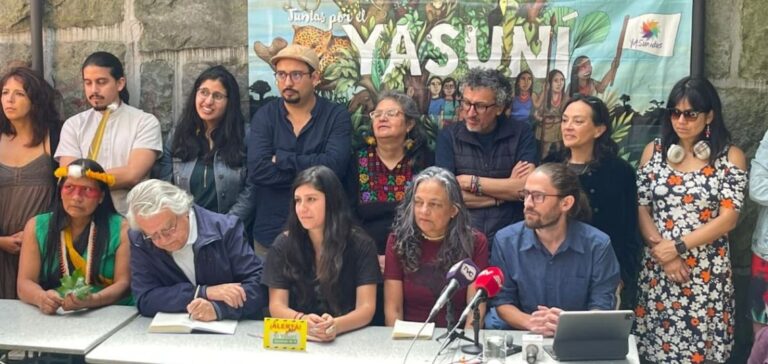It’s a “historic decision”, say Amazon defenders: a majority of Ecuadorians have voted to halt oil production at an emblematic deposit in the Yasuni Amazon reserve in eastern Ecuador.
Ecological victory: 59% of Ecuadorians vote to halt oil production in ‘Block 43’ in Yasuni referendum
In a referendum held on Sunday, in parallel with early general elections, Ecuadorians voted 59% in favor of halting production at “Block 43”, according to results published Monday morning and covering 93% of valid ballots. Requested by an environmental group for ten years, this national consultation was finally authorized last May by the country’s highest court. It was to decide on the future of the Ishpingo, Tambococha and Tiputini (ITT) block, known as “block 43”, from which 12% of the 466,000 barrels/day produced in Ecuador are extracted.
The question asked was, “Do you agree that the Ecuadorian government should keep ITT’s oil, known as Block 43, in the ground indefinitely?” Voters answered yes to 58.99% and no to 41.01%. The government, which opposed the consultation, estimated losses of $16.47 billion over 20 years if the block were revoked.
A unique biodiversity reserve, Yasuni covers almost a million hectares of primary rainforest. It is also a land of indigenous peoples: the historic territory of the Waorani, it is also home to the Kichwa, as well as the Tagaeri, Taromenane and Dugakaeri, the last communities living in voluntary isolation in Ecuador and fleeing modern civilization. Until now, the state-owned company Petroecuador was authorized to operate on some 300 hectares of Yasuni. She claims to have used barely 80 hectares of it.
A historic step forward for biodiversity and indigenous peoples hailed worldwide
“Today, Ecuador has taken a giant step towards protecting life, biodiversity and indigenous peoples!” celebrated the country’s two main indigenous organizations, Confeniae and Conaie, on the X network (formerly Twitter).
The Yasunidos environmental group, which instigated the referendum, also welcomed the decision:
“This consultation, born of citizens, demonstrates the greatest national consensus in Ecuador. This is the first time a country has decided to defend life and leave oil in the ground. This is a historic victory for Ecuador and for the planet”.
“Ecuador becomes the first country in the world to stop oil drilling thanks to direct climate democracy,” celebrated a collective of NGOs, including Amazon Frontlines, Yasunidos and Alianza Ceibo.
“The referendum result permanently protects one of the richest places on the planet, marking a major victory for indigenous peoples’ rights, rainforest conservation and the fight against climate change,” says a joint statement.
Several stars and international personalities had championed the cause of stopping “Block 43”, including actor Leonardo Di Caprio and Sweden’s Greta Thunberg. As of Monday morning, neither the government nor Petroecuador had officially reacted. Other blocks have been in production for decades in the northern part of the Yasuni, but they are nearing the end of their life, and “Block 43” was often presented, for the size of its reserves and its potential, as the jewel in Petroecuador’s crown.
Ecuadorian economy: Between prosperity and environmental dilemma, oil as a controversial pillar since the 1970s
Oil production has been one of the pillars of Ecuador’s dollarized economy since the 1970s. Crude oil, the country’s leading export, generated revenues of $10 billion in 2022, or around 10% of GDP. Nearly 500,000 barrels are produced every day in the country’s northeastern Amazon region, below the Andes mountains and in the jungles bordering Peru and Colombia.
This crude is transported by pipeline to the Pacific coast. Millions of hectares of wells, pipelines, tankers, tanker trucks, processing plants and flaming flares are all part of the region, which has been under state-led economic colonization since the 1960s… This industry has proved a boon to the state coffers and the country’s “development”, according to the authorities.
But a curse synonymous with debt, poverty and large-scale pollution, accuse pro-environment activists. The outgoing conservative president Guillermo Lasso (in power since 2021) intended to double national production. He will step down from power in October 2023, at the end of the second round of the anticipated presidential election, which will see a Socialist candidate and the son of a billionaire banana magnate face off.
Quito consultation: 68% support for ending mining in Choco Andino
On Sunday, in another local consultation, the inhabitants of Quito’s metropolitan district voted by 68% to stop mining in six small towns on the outskirts of the capital, in the Choco Andino territory, 287,000 hectares of forest, declared a biosphere reserve by Unesco. The area is often described as the lungs of Quito, and is home to the Andean bear.






















